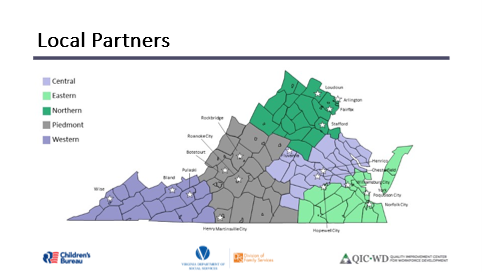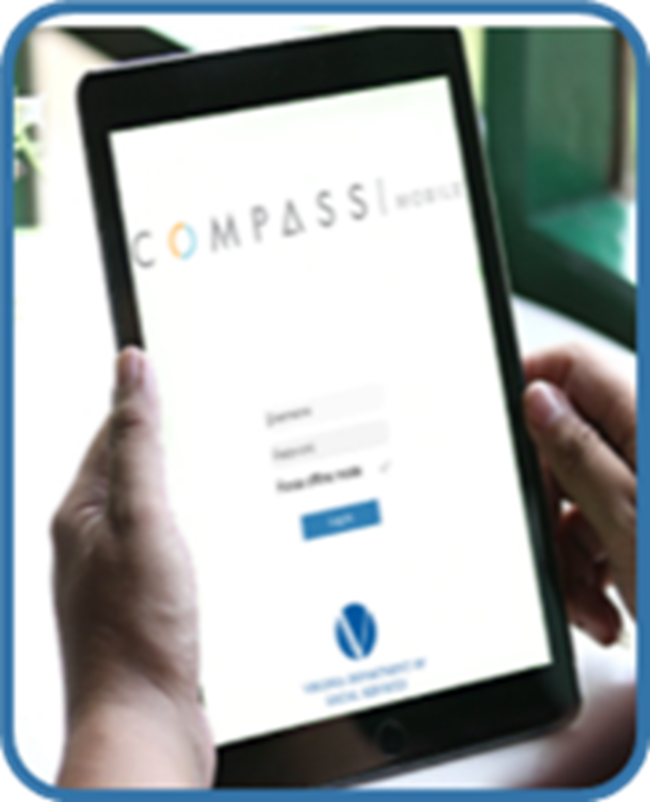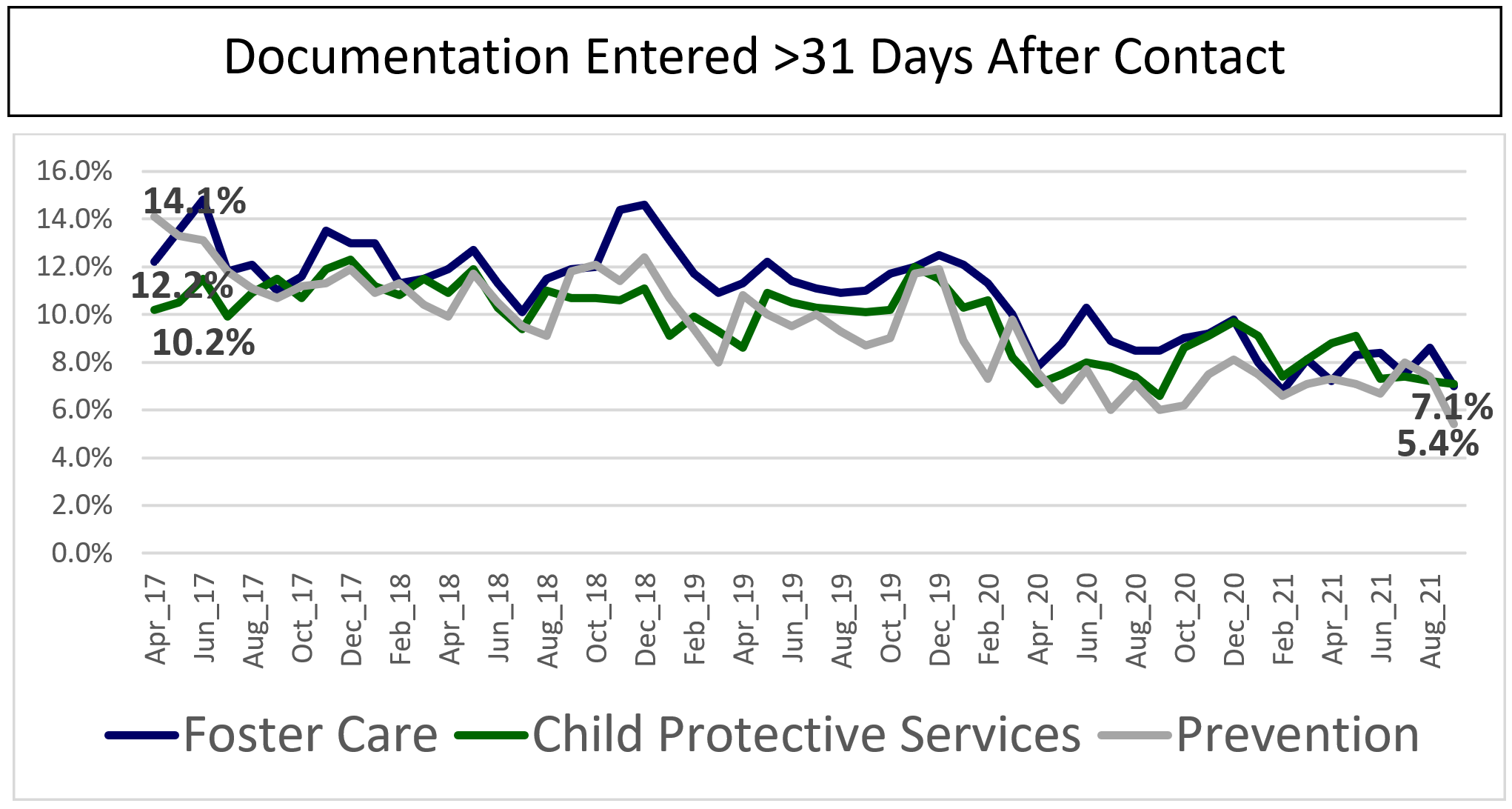Case-supportive Technology
Virginia Department of Social Services (VDSS) is a state-supervised, locally-administered child welfare system. The system includes approximately 2,000 staff, spread out across 120 local departments of social services (LDSS). In 2016, VDSS had a turnover rate of 29% among their entry level Family Services Specialists. They were working to implement technology tools for the workforce when they applied to be a Quality Improvement Center for Workforce Development (QIC-WD) site. Being part of the QIC-WD provided the opportunity for VDSS to shore up their implementation planning and evaluate their workforce initiative in 18 participating localities.
 VDSS conducted listening sessions in each region of the state and reviewed exit survey results to plan strategies to strengthen their workforce. Nearly 300 staff members participated in the VDSS listening sessions and they overwhelmingly reported that the required administrative tasks were a burden to staff. The biggest complaint among caseworkers was the lack of technological supports and flexibility to help them complete job tasks more quickly. Child welfare workers and supervisors clearly stated a desire for technological tools so that they could perform their job while in the homes of children and families, and capture data in real time data without having to return to the office. In response, VDSS decided to implement transcription services and develop a mobile app, accessible via iPads, to support frontline workers and supervisors. When the QIC-WD started working with VDSS, an Implementation Team was established to support the implementation of a transcription service and the development of a mobile app.
VDSS conducted listening sessions in each region of the state and reviewed exit survey results to plan strategies to strengthen their workforce. Nearly 300 staff members participated in the VDSS listening sessions and they overwhelmingly reported that the required administrative tasks were a burden to staff. The biggest complaint among caseworkers was the lack of technological supports and flexibility to help them complete job tasks more quickly. Child welfare workers and supervisors clearly stated a desire for technological tools so that they could perform their job while in the homes of children and families, and capture data in real time data without having to return to the office. In response, VDSS decided to implement transcription services and develop a mobile app, accessible via iPads, to support frontline workers and supervisors. When the QIC-WD started working with VDSS, an Implementation Team was established to support the implementation of a transcription service and the development of a mobile app.
 This video highlights the experience of workers and supervisors in Virginia who implemented case-supportive technology. |
VDSS and the QIC-WD developed a theory of change and a logic model to connect their activities with their desired outcome of improved worker retention. In 2017 VDSS implemented transcription services using FlexDictate (now called eScribers), a person-to-person system, where case notes are transcribed and the caseworker can copy the transcribed notes into their state data system. The rollout was quick and lessons were learned about implementation which helped inform the subsequent rollout of the mobile app, which they called COMPASS|Mobile.
An implementation advisory group was established to support COMPASS|Mobile and it engaged local case workers, supervisors, and administrators throughout the design, development, and implementation phases. As the mobile app was developed the implementation team used face-to-face meetings and surveys to capture fast feedback, and also held webinars with chat features to facilitate communication of questions and answers.
More than 1,500 workers were trained and 130 workshops were conducted between September 2019 and February 2020. During the trainings workers received a tablet and were prepared to immediately go out into the field and use COMPASS|Mobile. The goal was to provide child welfare workers with a mobile solution providing real time information, tools, and features enabling quality engagement with families.
The QIC-WD team designed a quasi-experimental time series pre-/post-analyses evaluation to study the implementation and outcomes of the technology intervention. FlexDictate usage peaked in the first year of implementation (2020) with over half of eligible users taking advantage of the transcription services. By the fall of 2021, following the implementation of COMPASS|Mobile, transcription usage waned to fewer than 1 in 5 staff. Localities differed on the degree to which their staff used transcription. In the first 15 months of COMPASS|Mobile, usage peaked right after rollout finished with around 200 staff using it. Caseworkers who were more likely to utilize the mobile app tended to be open to technology, have supervisors who supported and encouraged use of the app, and reported that they were grateful for the agency’s investment in the technology.
The evaluation found that roughly 50% of staff indicated that the technology tools provided the kinds of supports intended. Similarly, about 55% of staff reported that the mobility tools gave them: tangible support for their work including reduced time to enter documentation; the ability to respond efficiently to the needs of their clients; and it increased time available to spend on other tasks. In addition, over one-third of workers reported that the tools resulted in an increase in accuracy when entering client demographic information into their data system, allowing them to spend more time with: service providers; clients; in case planning activities; and with supervisors. Most workers (84%) were satisfied with the COMPASS|Mobile application and about half felt that the application enhanced their engagement with families whereas about a quarter felt the application hindered their engagement with families. Importantly, 62% of workers reported that the technology tools lowered their stress because they could document their work in real time.
A key finding from the QID-WD evaluation was the downward trend in overdue documentation over the study period. Between August 2017 and August 2021, and across all case types (foster care, child protective services and prevention), the percentage of contacts that were not documented for over a month was reduced by a third to a half. By the end of the study period and across all case types, an average of 1,000 contacts were being documented each month in a more timely manner.

While the data suggest that the intervention did not impact turnover, it had other important positive effects on expected outcomes. The provision of case supportive technology that facilitated real time reporting enhanced staff beliefs that the VDSS cares about supporting its staff and is willing to invest in efforts to do so. It provided staff flexibility in when and where casework was completed. It was associated with reduced levels of personal and organizational stress and improvements in perceived support by supervisors and co-workers and family engagement. Overall, staff reported positive impacts including time savings and improvements in the accuracy of information documented in real time. Moreover, improvements in the timeliness of visit documentation mean that, on average, a thousand more cases were being updated before the months end than had been prior to the intervention. The COMPASS|Mobile system also enabled statewide communications and pivoting to a telehealth model during the COVID-19 lockdown.
VDSS intends to continue using transcription and mobile application tools to support their workforce. They actively add features to COMPASS|Mobile, in response to the needs of frontline workers, and gather feedback and make adjustments to the system to ensure the sustainability of the tool into the future.
All site-specific resources summarized here can be found on the QIC-WD website.